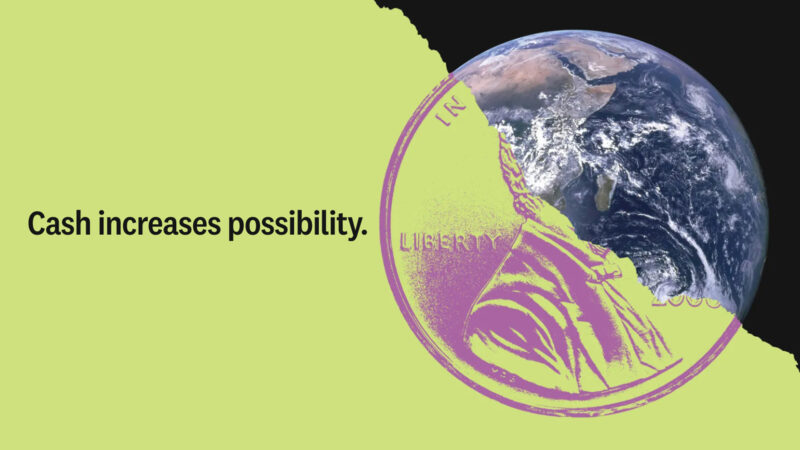Press Release
New OpenResearch Results Further Prove Guaranteed Income’s Critical Role in Supporting Families
07. 22. 2024
OpenResearch three-year study reinforces promising lessons of cash’s impact on entrepreneurship, families, and mobility

New York, NY – Today OpenResearch published the results of its study on one of the most comprehensive guaranteed income pilots in history. The study explored how cash impacted the lives of guaranteed income participants, and findings highlight the power of cash in boosting income, fostering economic mobility, and encouraging entrepreneurship. For the past three years, OpenResearch, a nonprofit research organization supported by OpenAI’s Sam Altman, distributed a variable amount of cash, either payments of $1,000 per month to recipients or $50 per month to control participants, reaching a total of 3,000 people. Since its founding in 2016, Economic Security Project has worked at the frontlines of advancing innovative cash policy and shining a light on guaranteed income’s impact on the lives of families and communities. In the intervening years, there has been an explosion of over 150 guaranteed income pilots across 35 states reaching 52,000 people and counting, including the participants from OpenResearch.
“This study proves what dozens of pilots have already demonstrated: guaranteed income works. The results strengthen the existing body of research that showcases the power of cash to support economic mobility, increase household income, and reduce the strain of caregiving. OpenResearch’s findings further underscore how guaranteed income can serve as a mechanism to help people plan for the future, to foster economic mobility, and to accelerate entrepreneurship, particularly among women of color. Guaranteed income works best in tandem with other policy solutions, and we are excited to continue our work to promote cash policies and other legislative actions that can address entrenched issues in childcare, healthcare, employment, and more,” said Shafeka Hashash, Associate Director, Guaranteed Income of Economic Security Project.
Economic Security Project highlighted five key takeaways from the OpenResearch report:
- Guaranteed income gave participants the flexibility to pursue professional opportunities that could lead to longer-term economic benefits: Whether starting a job training or seeking a career with more promising growth potential, participants were able to pursue employment opportunities that could result in greater long-term financial prospects.
- On average, recipients were 3.3% more likely to have pursued education or job training during the program’s final year compared with the control participants. The impact was most significant for the lowest income group, who were ~7% more likely to have pursued education or job training during the program’s final year.
- Cash activated entrepreneurship, particularly among communities of color and women: The increase in the number of people who started or helped others start a business in the final year was more pronounced, particularly for Black participants and women participants. Guaranteed income serves as a way of activating untapped economic potential in communities across the country by providing the capital needed to build a business.
- By the third year, Black recipients were ~9% more likely to report starting or helping to start a business than those in the control participants, and 5% of women recipients reported starting or helping to start a business.
- Guaranteed income enabled participants to invest their time in nurturing their families: Many families juggle multiple demands on their time that are unpaid and, therefore, harder to track, such as caring for family members or volunteering in their community. Whether taking care of loved ones, focusing on retaining one good job rather than balancing multiple jobs, managing and planning household finances, or investing in a new skill, guaranteed income allowed participants to choose how to spend their time to invest in themselves, their family, and their community. In effect, guaranteed income provided compensation for unpaid labor such as childcare, the pursuit of education, financial planning, or community involvement.
- The research noted a reduction in work hours among recipients when compared with the control participants, and this can be largely attributed to recipients increasing the time they spend with family, running home errands, or taking care of medical needs. Recipients were 2% less likely to be employed during years two and three than participants in the control participants, which averages to roughly ~ eight fewer days of employment per year for recipients.
- Cash allowed participants to choose housing environments that work best for their families: Too many people live in inadequate living arrangements because they have limited housing options; cash provided participants with the resources they need to choose living arrangements that work better for them, whether that be reducing commute time to a job, moving closer to loved ones, or living independently. This study showed how monthly cash payments gave people greater control to decide their own living environment. The housing implications of this study are particularly timely given that HUD announced this summer they would allow certain housing authorities to pursue direct cash rental assistance in lieu of traditional housing vouchers.
- High cash recipients were 4.2% more likely to pay for housing than to stay with family, friends, or another living arrangement that did not involve regular payments. The effect was most significant for the lowest-income participants; among this group, recipients were 5.7% more likely to pay for housing than control participants.
- Guaranteed income is not a silver bullet and must be accompanied by a renewed social contract: Guaranteed income plays a critical role in alleviating some of the harms caused by the lack of quality affordable housing, childcare, and healthcare. Guaranteed income is not the singular systemic solution, it must be accompanied by a host of other public policy interventions to improve access to affordable housing, healthcare, childcare, education, and more.